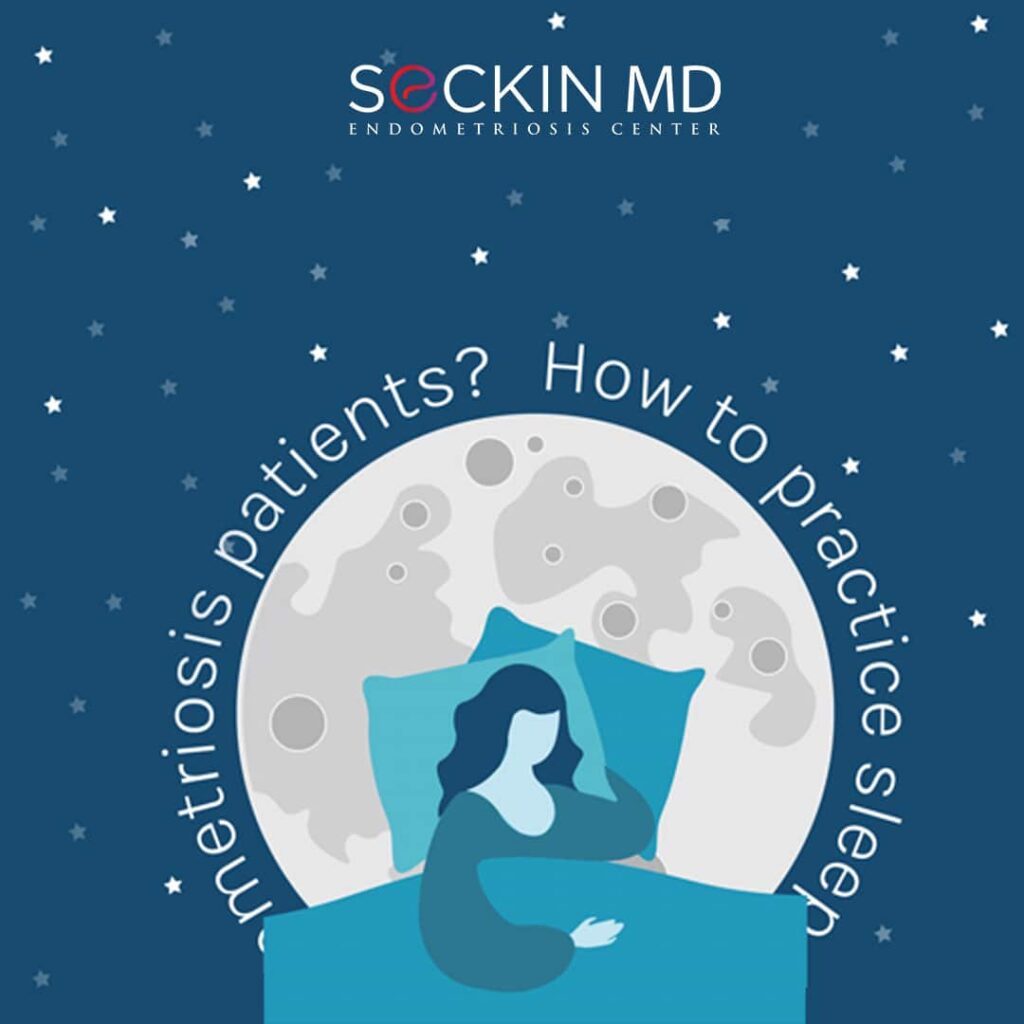Sleep Hygiene for Endometriosis Patients

Sleep hygiene plays a crucial role in maintaining immunity, metabolism, and other vital functions [1]. Not having enough sleep can affect your mood, ability to grasp and comprehend information, and even cause long-term health problems [2].
Endometriosis can have a negative effect on your sleep quality [3]. Practicing proper sleep hygiene can help promote better sleep and consequently enable you to get proper rest and maintain an active lifestyle.
How does endometriosis affect sleep quality?
Research has shown that the sleep quality of patients with endometriosis is lower compared to that of healthy individuals [4].
Factors affecting sleep quality include painful periods (dysmenorrhea), chronic pelvic pain, and lack of physical activity.
On the reverse side, certain aspects of changed sleep patterns such as night shift work may increase the risk of endometriosis [5].
Poor sleep quality in women with endometriosis is associated with poorer quality of life, more depressive symptoms, and increased bladder pain [6].
It is therefore important to ensure good sleep quality. This can be improved through practicing good sleep hygiene.
What is sleep hygiene?
Sleep hygiene refers to the collective measures that you can take to improve your overall quality of sleep [7].
What are the signs of poor sleep hygiene?
If you practice poor sleep hygiene you may have disturbed sleep. You may also feel sleepy during the daytime. Poor sleep hygiene can even cause increased appetite [8].
Not maintaining proper sleep hygiene can lead to fatigue, lack of motivation, mood changes, poor decision making, and trouble with concentration [9].
How to practice good sleep hygiene?
You can improve your sleep hygiene by adopting a few behavioral changes and altering certain aspects of your sleep environment. Behavioral changes include setting yourself a sleep schedule, limiting daytime naps, setting a pre-sleep routine, ensuring proper diet and fluid intake, and minimizing the use of digital devices closer to bedtime.
Your sleep schedule
Practice going to bed and waking up at exactly the same time every day. This tunes the body’s internal clock to get into a rhythm of a consistent sleep-wake cycle. It also helps to target a particular time as your bedtime and ensure that you are ready for sleep by then. While setting a sleep schedule, make sure to do it gradually to allow for easy adjustment.
Daytime naps
A quick nap during the day can be helpful to get rest and regain energy but overdoing it can upset your sleep during the night [7]. Limit the number and duration of naps and keep them to times before the afternoon so that you are able to balance both daytime rest and nighttime sleep.
Your pre-sleep routine
A pre-sleep routine that starts about 30 minutes before your bedtime can help you make a smooth transition from wakefulness to sleep [10]. This could be anything relaxing including a warm bath, or a relaxing book. Avoid stressful and emotional activities as much as possible nearer to your sleep time.
Your diet and fluid intake
Finish dinner several hours before bedtime and avoid foods that are likely to cause indigestion [7]. Cut down on smoking and alcohol and avoid stimulants such as caffeine before going to bed, or even past afternoon hours. [9]. Having adequate fluid intake at night – but not very close to bedtime – will prevent sleep disturbance due to thirst.
The use of digital devices
Digital devices such as laptops, smartphones, and tablets can stimulate the mind resulting in a late onset of sleep or even disturbed sleep [7]. These devices’ screens generate blue light that can inhibit the natural production of a hormone called melatonin, which induces sleep [11].
Melatonin therapy?
A Phase 2 randomized clinical trial involving 40 women with endometriosis, ages 18 to 45 showed that melatonin treatment significantly reduced endometriosis-associated chronic pelvic pain and improved sleep quality without having to use a painkiller [12]. If you are experiencing occasional insomnia, discuss with your doctor the possibility of melatonin therapy [11].
Environmental changes
A tranquil sleeping environment is essential to fall asleep easily [7]. Make sure that you set your bedroom at a comfortable temperature, that you block light and noise as much as possible, and that your bedding such as mattresses and pillows are comfortable. A calming scent or soothing music may also help you fall asleep easier.
References
- Benefits of Sleep, Healthy Sleep
- Consequences of Insufficient Sleep, Healthy Sleep
- The relationship between insomnia and endometriosis, Journal of Clinical Sleep Medicine
- Effects of endometriosis on sleep quality of women: does life style factor make a difference?, BMC Women’s Health
- Shift Work, hCLOCK T3111C Polymorphism, and Endometriosis Risk, Epidemiology
- A Quantitative Analysis of Sleep Quality in Women with Endometriosis, Journal of Women’s Health
- Sleep Hygiene, Sleep Foundation
- Seven signs of poor sleep, The University of Alabama at Birmingham
- Inadequate Sleep Hygiene, American Sleep Association
- Twelve Simple Tips to Improve Your Sleep, Healthy Sleep
- Melatonin for Sleep: Does It Work?, Johns Hopkins Medicine
- Efficacy of melatonin in the treatment of endometriosis: A phase II, randomized, double-blind, placebo-controlled trial, Pain
Get a Second Opinion
Our endometriosis specialists are dedicated to providing patients with expert care. Whether you have been diagnosed or are looking to find a doctor, they are ready to help.Our office is located on 872 Fifth Avenue New York, NY 10065.
You may call us at (646) 960-3080 or have your case reviewed by clicking here.